Battle of Kursk II - 16 August 2024 - Day 11
 The operation of the Defense Forces on the territory of Russia continues for ten days . During this time, the Armed Forces took control of 82 settlements and created a military commandant's office . What foreign media write about the goals of Kyiv and the consequences of the operation collected by Suspilne.
The operation of the Defense Forces on the territory of Russia continues for ten days . During this time, the Armed Forces took control of 82 settlements and created a military commandant's office . What foreign media write about the goals of Kyiv and the consequences of the operation collected by Suspilne.
The offensive in the Kursk Oblast can help the US make better decisions in a potential war with China, writes Wess Mitchell, director of The Marathon Initiative and former US Assistant Secretary of State for European and Eurasian Affairs, for Foreign Policy. According to him, the optimal approach for the United States is to use this military operation as an opportunity to inflict an indirect defeat on the Russian Federation sooner than China will be ready to act against Taiwan.
"By giving the Ukrainians the necessary means, given their achievements, Washington has a chance to help Kyiv force Moscow to sit down at the negotiating table, to buy time for the rearmament of the West, which will allow the US to switch its attention to the Indo-Pacific region," says the expert.
The Polish edition of RMF24 spoke with the coordinator of the Eastern Europe program of the Polish Institute of International Relations, Daniel Szeligowski. He believes that the Kursk operation gives hope for the beginning of dialogue between Russia and Ukraine in the fall: "We are two steps away from the activation of diplomacy . " The probability of negotiations will become even greater, the expert suggests, if Donald Trump wins the US presidential election: "They (Ukrainians) fear that Trump will condition military aid on readiness for negotiations with the Russians. So they are signaling this readiness, hence Zelensky's actions."
Dr. Tolga Sakman, head of the Istanbul DIPAM Center, wrote a column for the Turkish Anadolu . In it, he says that after the Wagner mutiny in June 2023, the Kursk operation is the biggest challenge for Vladimir Putin. Sakman also believes that hostilities in the Russian Federation will strengthen Ukraine's position in possible peace negotiations with Russia.
Other goals of Ukraine, according to Sackman: to weaken the Russian army both in general and on the main front line, to create a buffer zone for the border regions of Ukraine and to expose Putin's bluff about "red lines" and threats with nuclear weapons. "This operation is an important step to show Russia, and especially the West, that Ukraine is not doomed. Kyiv wants to demonstrate that it can win if the West increases the supply of weapons," says Sakman.
The New York Times in its analysis says that Kyiv has several options for action. The first is to continue advancing deep into Russia. The second is to gain a foothold in the territory controlled by the Defense Forces. The third is, taking into account the situation in the Pokrovsky direction, where the Russian Federation is advancing, to decide that it has already proved to both the West and Moscow that Russia is not invincible. "Perhaps the Ukrainians are trying to convince the West that they will not surrender, and that the United States, in particular, should allow them to use American long-range cruise missiles inside Russia," the NYT article says.
Journalists of the British Economist draw attention to the fact that the operation in the Kursk region coincided with the 81st anniversary of the defeat of Nazi Germany in the same region. The publication calls it the "Second Battle of Kursk". The BBC describes the offensive of the Defense Forces as Ukraine's boldest and riskiest move this year. A high-ranking British official praised the planning of the operation in a comment to journalists: "The most amazing thing about this is how well the Ukrainians have mastered combined warfare. They have deployed everything from air defense to electronic warfare, as well as armored vehicles and infantry. It is impressive."
The Canadian Broadcasting Corporation CBC released a conversation with journalist Susan Bonner. In her opinion, the main goal of the Kursk operation is to change the prejudiced attitude towards the course of the war. During the last year, the Ukrainians were on the defensive. There were more and more frequent calls for peace negotiations and incentives to surrender territories in exchange for peace. "So the Ukrainians managed to change the narrative," says Bonner.
Putin may feel a threat to the regime due to the invasion of the Kursk region, the journalist believes: "When things are going badly, he is silent. In the first few days, Putin was nowhere to be seen, because they had no answer, they were caught off guard." Bonner also suggests that this operation is not a "red line" for Moscow, after which it can use nuclear weapons: "The Ukrainians demonstrated that all this logic that we were guided by in the West regarding the fear of escalation was self-restraint."
But Al Jazeera has collected the opinions of pro-Kremlin journalists and pro-Russian experts. Russians (in particular, Mykhailo Rostovsky from the newspaper "Moscow Komsomolets", politician Leonid Gozman) call Ukrainians a strong opponent, with whom one must be ready. Oleksiy Malinin, founder of the Center for International Interaction and Cooperation, told Al Jazeera that from Russia's point of view, the operation in the Kursk region is counterproductive to peace talks.
|
NEWSLETTER
|
| Join the GlobalSecurity.org mailing list |
|
|
|

